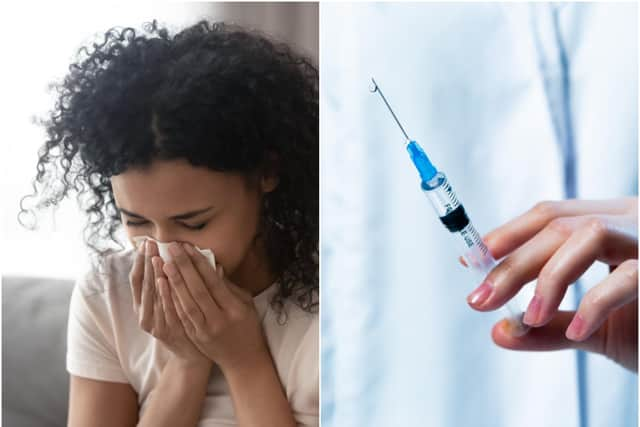Hay fever injection: how does it work, can you get it on the NHS and symptoms of allergic rhinitis
and live on Freeview channel 276
Hay fever season is now well underway, with some people across the UK suffering from itchy throats, watering eyes and runny noses as pollen levels rise.
There’s a variety of treatment options available for those who suffer from hay fever, including tablets and nasal sprays.
Advertisement
Hide AdAdvertisement
Hide AdBut what is the hay fever injection, does it involve steroids, how much does it cost and is it available on the NHS?


Here’s everything you need to know.
What is hay fever?
Hay fever is an allergic reaction to pollen and usually occurs when it comes into contact with your mouth, nose, eyes and throat.
Hay fever season typically starts at the end of March until the end of September, with various pollen stirring allergies at different times throughout the summer.
Tree pollen occurs first, typically from late March to mid-May. Grass pollen then usually lasts from mid-May until July, with weed pollen covering the end of June to September.
What are the symptoms of hay fever?
According to the NHS, symptoms of hay fever include:
- sneezing and coughing
- a runny or blocked nose
- itchy, red or watery eyes
- itchy throat, mouth, nose and ears
- loss of smell
- pain around your temples and forehead
- headache
- earache
- feeling tired
If you have asthma, you might also:
- have a tight feeling in your chest
- be short of breath
- wheeze and cough
What is the hay fever injection?
Advertisement
Hide AdAdvertisement
Hide AdIf you suffer badly from hay fever then your GP might prescribe you a steroid treatment, such as a steroid nasal spray.
However, if steroids and other hay fever treatments - such as antihistamine drops, tablets or nasal sprays - do not work, your GP may then refer you for immunotherapy on the NHS.
This means that you will be given small amounts of pollen as an injection or tablet to slowly build up your immunity to pollen.
According to the NHS, “This kind of treatment usually starts in the winter about three months before the hay fever season begins.”
Advertisement
Hide AdAdvertisement
Hide AdHowever, immunotherapy is a specialist service that may not be available everywhere, and may depend on where you live.
Some private clinics also offer a different hay fever injection, which is the Kenalog corticosteroid injection with anti-inflammatory properties, and differs from the NHS immunotherapy injection.
Regent Street Clinic explains that if you have severe symptoms of hay fever that fail to respond to other treatments, then it is possible to request an appointment to discuss the hay fever injection at their clinics in Nottingham, Derby, Sheffield, Watford and Leicester.
This hay fever injection - which costs £75 per 40mg dose - suppresses the immune system and stops an extreme response to pollen, but the doctor will undertake a careful risk assessment to make sure that you are a good candidate for treatment before it is administered.
Advertisement
Hide AdAdvertisement
Hide AdHowever, Pharmacy2U’s Superintendent pharmacist, Phil Day, says the steroid injection Kenalog “is only safe and recommended for use in a small group of people, as intramuscular steroids can exacerbate existing medical conditions.”
In regards to side effects from the injection, the Regent Street Clinic website says: “In our twenty-year experience of administering the hay fever injection, we have seen virtually nothing in the way of even mild ‘side effects’ with two people reporting a dimpling of the skin at the site of the injection (the buttock).”